Nigerian Igbo highlife music: Prince Nico Mbarga
Known as prince Nico Mbarga, Nigerian singer Nico Mbarga was born in Abakaliki in East Nigeria on 1st January 1950. His father came from Cameroon and his mother from Nigeria. His father, Cosmos Obama Mbarga could play the sansula (thumb piano or lamellophone) and Nico spent his childhood in Ikom on the Cameroon border. There, he played a self-built xylophone, the conga and drums in school bands. When a war broke out in Biafra, in 1967, he fled to Mamfe (Cameroon) where he could pursue his musical ambitions. He learned to play the electric guitar and was inspired by Congolese music. He debuted with hotel band Melody Orchestra in 1970. When, in 1970, the civil war had come to an end, he returned to Nigeria where he formed his group Rocafil Jazz in Onitsha.
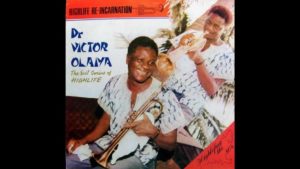
There, he met multitalented bandleader Bobby Benson who played popular highlife with his ‘Bobby Benson Jam Session’ band. Trumpeter Victor Olaiya was also a member of this band – his name was actually Victor Abimbola Olaiya but he preferred to be called Dr. Victor Olaiya. He was the 20th child in a family of 24 and was born in Calabar on 31 December 1930 – so currently 88 years old. Olaiya’s parents were very wealthy and came from the Yoruba city of Ijesha Ishu in Ekiti State. Olaiya himself was married to many women. Some of his children became famous, like his daughter Moji Olaiya, a Nollywood actress who died at an early age and his son Bayode Olaiya who both sings in his father’s band and works in a bank. Olaiya’s highlife is mainly based on Ghanaian melodies, whereas Roy Chicago who also played in Bobby Benson’s band had a preference for Nigerian themes.
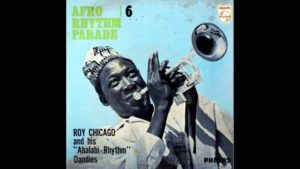
Roy Chicago (John Akintola Ademuwagun), played the trumpet and the saxophone and was the first to introduce talking drums – hourglass-shaped drums whose pitch can be regulated – to the highlife music style. A good example of this is ‘Olowo Gbaya Ole’ a track by Roy Chicago & his Abalabi Rhythm Dandies; a song about a young man losing his girlfriend to a rich gentleman: ‘no money, no love’. When the Nigerian civil war in East Nigeria was over, various bands were formed which sang in the Igbo language; Oriental Brothers International lead by Godwin Kabaka Opara being the first. From 1977, this band split up into various new groups, such as “Oriental Brothers International Band” led by Dr Sir Warrior, “Prince Ichita & the Great Oriental Brothers International Band” and “The Original Dr Sir Warrior & His Oriental Brothers International”, also called “The Oriental Original”. Their music style is known as Igbo Highlife. Another very popular highlife band from East Nigeria was ‘Ikenga Super Starts of Africa’ led by Vincent Okoroego. To the Igbo, Ikenga is the name of one of the most powerful spirits. But also musicians from other parts of Nigeria played in their band; they did not only sing in Igbo, but also in Pidgin English. Their music style is sometimes called Pidgin Highlife.
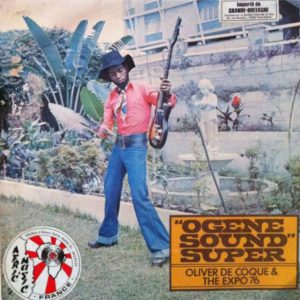
Oliver de Coque was the most productive Nigerian guitar player; he recorded as many as 73 LPs. He was actually called Oliver Sunday Akanite and was born in the centre of Igbo land in 1947. He loved to play a game of draughts and, as he used to win most of the games, he was nicknamed ‘Game master’. Later in life, he was called Oliver De Ka Okwe, because the word ‘Okwe’ means draughtboard in Igbo. Ultimately, his name became Chief Oliver de Coque. During the Nigerian civil war he played in the band of the Biafra army. Oliver de Coque was a shopaholic who spent loads of money on cloths and other things. When he was old, he suffered from high blood pressure and diabetes and he died of a heart attack in 2008.
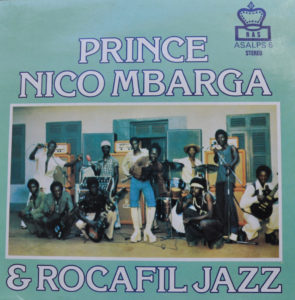
In 1976, he contributed to the album ‘Sweet Mother’ by Prince Nico Mbarga. Mbarga had already sent the song, which was written in 1974, to his record producer EMI, but they considered it too childish to record. Two year later, however, the song was released by Rogers All Stars and it became the best sold African song ever. The LP sold over 13 million copies and some people even said ‘Sweet Mother’ was Africa’s anthem. Still, when all foreigners without a resident permit had to leave Nigeria in 1983, the Cameroonian Rocafil Jazz band members were amongst the 2 million West Africans who had to leave all of a sudden.
In 1997, Rocafil Jazz had plans to tour the United States. But when Nico Mbarga took his car to collect his visa, he ran out of petrol (in the rich ‘oil country’ of Nigeria it often happened that there was no petrol available!) and took a motorcycle taxi which was hit by a car. Nico fell with his head on the street and died of his injuries in a hospital a few weeks later.
For more interesting details look here: Prince Nico Mbarga:
And for those who would like to have a look at the complete lyrics of: “Sweet Mother” wil zien
Thanks to the Muziekweb in Rotterdam.
![]()
And thanks to Gerrit Kalsbeek.
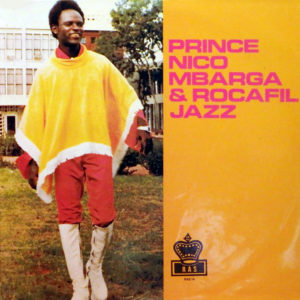
- Prince Nico Mbarga & Rocafil Jazz: Good Father (9:32). LP: Good Father, 1977. Composer: Nico Mbarga. Rogers All Stars RAS 14
- Dr Victor Olaiya & his International Stars Band: Mo Fe Mu’Yan (4:47).
LP: Highlife Re-incarnation, 1982. Composer: Victor Olaiya. Polygram, POLP 073 - Roy Chicago & his Abalabi Rhythm Dandies: Olowo Gbaya Ole (2:57). EP: Afro Rhythm Parade – Vol. 6, ± 1965. Composer: Tunde Osofisan. Philips, P 420 013 E
- Oriental Brothers International, conducted by Godwin Kabaka Opara: Onye Oma (4:55). LP: Nwa Ada Di Nma, 1975. Composer: Ferdinand Opara. Decca, DWAPS 59
- Ikenga Super Stars of Africa: Men of Today (5:09). LP: Peace Movement Social Club Of Nigeria, 1976. Composer: Vincent Okoroego? Rogers All Stars, SP 2109
- Prince Nico Mbarga & Rocafil Jazz: Na My Choice (9:38). LP: Good Father, 1977. Composer: Nico Mbarga. Rogers All Stars RAS 14
- Prince Nico Mbarga & Rocafil Jazz: Stella (6:03). LP: Music Line, 1976. Composer: Nico Mbarga. Decca, 278.154 (ASALPS 8)
- Oliver de Coque & the Expo 76: My Cherry (4:13). LP: Ogene Sound Super, 1976. Composer: Oliver de Coque. Olumo Records, ORPS 48
- Prince Nico Mbarga & Rocafil Jazz: Sweet Mother (9:55). LP Sweet Mother, 1976. Composer: Nico Mbarga. Rogers All Stars, RAS 6








